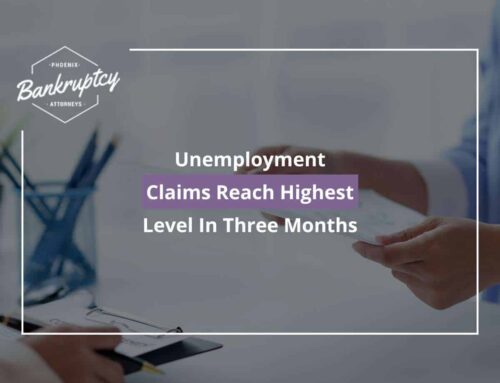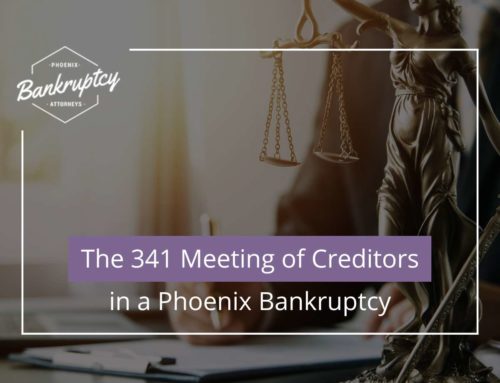Bankruptcy has many unearned reputations, like it is only used by people who are financially irresponsible or that a bankruptcy debtor must give up all of their assets. Another common misconception about bankruptcy is that it is always a complicated and stressful ordeal. There are a few reasons these rumors spread. Big companies have an interest in discouraging their customers from filing bankruptcy and discharging their debts to them and therefore use media influence to convey the message that filing for bankruptcy is an immoral thing. Bankruptcy debtors have the right to represent themselves but will lose out on the expertise and guidance of a skilled legal professional. This can result in mishaps and errors that a dedicated bankruptcy attorney should help the debtor avoid. Read on to learn more about what you can do to make sure that your bankruptcy filing goes off without a hitch. To schedule your free consultation with one of our Phoenix bankruptcy attorneys, call 480-263-1699.

Make Sure You Qualify For Your Desired Chapter Of Bankruptcy
The two most common forms of consumer bankruptcy are Chapter 7 and Chapter 13. They offer separate and unique benefits, but not every bankruptcy debtor has the option of either of the two. The income qualifications for Chapter 7 and Chapter 13 are very different. A Chapter 7 bankruptcy debtor must prove that their income isn’t high enough to pay off debts and maintain a reasonable standard of living. A Chapter 13 bankruptcy debtor must be able to prove they have sufficient income to pay off the required debts for a reorganization payment plan. A Chapter 7 bankruptcy debtor who makes too much money will likely have their case dismissed. The same can be said for a Chapter 13 bankruptcy debtor who doesn’t make enough money or whose debts exceed the statutory limits. Many debtors who make the mistake of filing under the wrong chapter can refile their cases under the appropriate chapter. However, this can come with additional costs and reduced protections from the automatic stay.
Inform Your Creditors Of Your Attorney To Reduce Collection Calls
One of the benefits of retaining a bankruptcy attorney for your case is that they can handle all inquiries about your debts from your creditors. Creditors who continue to contact you after informing them of your Arizona bankruptcy attorney can face penalties from the court. Eliminating creditor harassment will take away one of the distractions that can keep you from filing a full and accurate bankruptcy petition.
Time Your Filing To Protect Your Paycheck
Arizona has an inconveniently low bankruptcy exemption for bank accounts and cash on hand of $300. Any amount over the bankruptcy exemption can be claimed and seized by the trustee assigned to the case. This means you’ll probably want to time your filing to be at the point in the month when you have the least amount of funds in your bank account. Filing on payday could result in a significant balance owed to the bankruptcy trustee.
Be Aware Of The Ramifications For Your Tax Refund Too
Arizona lacks protections not just for bankruptcy debtors’ bank accounts but their tax refunds as well. The bankruptcy trustee will usually automatically take any amount refunded to a debtor in an active case. Whenever possible, a person considering bankruptcy should wait until they have received and spent their tax refund before filing. This is the best way to guarantee that the refund won’t become a part of the bankruptcy estate. It is also a good opportunity to catch up on expenses that the debtor may have been putting off, like paying for a medical procedure, car repairs and maintenance, or even retaining an Arizona bankruptcy lawyer.
Don’t Favor Any Of Your Creditors While Preparing To File
There are some payments that you should keep up with if you intend to file for bankruptcy, but some that it would be more strategic to wait to discharge. For example, filing for bankruptcy won’t clear your obligation to pay secured debts for assets you wish to keep like your house or car, so you should continue making these payments before, during, and after your bankruptcy. However, you could face negative repercussions if you pay off one unsecured creditor in favor of another- for example, if you pay back a personal loan you owe your parents rather than your credit card bills.
Start Gathering Your Documents Sooner Rather Than Later
You will need several types of documents to support the information that you provide to the court in your bankruptcy petition. Not having them available when necessary can cause delays and other issues in your filing. If you aren’t up to date on your tax returns, these should be completed before your case is filed. Documents like a government-issued form of identification and your social security time could also take time to procure. Leaving these types of issues to deal with at the last second can hurt your case.
Take Your Credit Counseling Course In Advance
Every bankruptcy debtor is required to take two credit counseling courses: the first should be taken before filing and the second should be taken within 60 days of the 341 Meeting of Creditors. The first credit counseling certificate is valid for 180 days, meaning it can be taken up to 6 months in advance of filing your bankruptcy petition. Don’t procrastinate taking this course if you know you will be filing in the next few months. You never know when an issue will arise that would require you to file for bankruptcy immediately, or if you will have technological issues when you need to complete your online course. Similarly, you should complete your second credit counseling course as soon as possible after the 341 Meeting of Creditors rather than pushing it back until the end of your 60-day deadline.
Watch Your Credit Card Spending
It might seem like a great idea to spend as much as you can on your credit cards before those bills get wiped away with the rest of your unsecured debts in bankruptcy. However, this type of conduct is considered fraudulent and abuse of the bankruptcy process. Bankruptcy trustees will be on the lookout for excessive credit card spending while preparing for bankruptcy, and these creditors can also object to your credit card debts being discharged. The current limits for pre-bankruptcy credit card spending are $1,100 in cash advances in the 70 days before filing and $800 in luxury spending in the 90 days before filing.
Hire An Experienced Bankruptcy Team To Handle Your Case
Retaining a bankruptcy firm to represent you will cost you upfront but can save you far more throughout your case. Phoenix Bankruptcy Attorneys will make sure every possible debt is discharged and address pushback from creditors and the trustee. There are many steps in the bankruptcy process that a bankruptcy firm can take off of your plate. Learn more about the benefits of filing for bankruptcy with our Phoenix bankruptcy team risk-free and see if you qualify for our Zero Down payment program. Contact us through our online form to get started with your free consultation or call 480-263-1699.
PHOENIX BANKRUPTCY ATTORNEYS
PHOENIX BANKRUPTCY OFFICE
668 N. 44th St., Ste 300
Phoenix, AZ 85008
Phone: 480-263-1699
Email: info@phoenixbankruptcyattorney.co
MESA BANKRUPTCY OFFICE
1731 West Baseline Rd., Ste 100
Mesa, AZ 85202
Email: info@phoenixbankruptcyattorney.co
GLENDALE BANKRUPTCY OFFICE
20325 N. 51st Ave., Ste 134
Glendale, AZ 85308
Email: info@phoenixbankruptcyattorney.co
TUCSON BANKRUPTCY OFFICE
2 East Congress Street, Ste #900
Tucson, AZ 85701
Email: info@phoenixbankruptcyattorney.co





